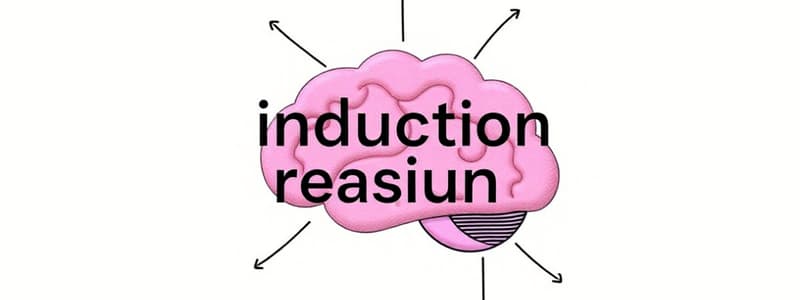Podcast
Questions and Answers
What is the primary characteristic of inductive reasoning?
What is the primary characteristic of inductive reasoning?
- It results in universally accepted conclusions.
- It allows for conclusions that may or may not be valid. (correct)
- It is based on established facts and laws.
- It draws conclusions based on general principles.
In the following example, which type of reasoning is being used? 'All dogs are mammals. Rex is a dog. Therefore, Rex is a mammal.'
In the following example, which type of reasoning is being used? 'All dogs are mammals. Rex is a dog. Therefore, Rex is a mammal.'
- Analogical reasoning
- Deductive reasoning (correct)
- Abductive reasoning
- Inductive reasoning
Which of the following statements reflects a misconception often associated with inductive reasoning?
Which of the following statements reflects a misconception often associated with inductive reasoning?
- Inductive reasoning is based on a series of specific instances.
- Inductive reasoning can lead to a generalization.
- Inductive reasoning guarantees that conclusions are valid. (correct)
- Inductive reasoning may not always reach a universally applicable conclusion.
What is a key feature of deductive reasoning?
What is a key feature of deductive reasoning?
Which conclusion can be validly reached using inductive reasoning after observing that some dogs are friendly?
Which conclusion can be validly reached using inductive reasoning after observing that some dogs are friendly?
Why might the conclusion 'All first-year college students are males' be considered an example of faulty inductive reasoning?
Why might the conclusion 'All first-year college students are males' be considered an example of faulty inductive reasoning?
In which situation is deductive reasoning not applicable?
In which situation is deductive reasoning not applicable?
Which of the following pairs exemplifies a correct use of deductive reasoning?
Which of the following pairs exemplifies a correct use of deductive reasoning?
What can be concluded from the premise that the number 35 ends with a 5?
What can be concluded from the premise that the number 35 ends with a 5?
Which of the following statements accurately describes a mathematical proof?
Which of the following statements accurately describes a mathematical proof?
What elements are essential in a mathematical system?
What elements are essential in a mathematical system?
What role do axioms play in a mathematical system?
What role do axioms play in a mathematical system?
What is the primary characteristic of a theorem within a mathematical system?
What is the primary characteristic of a theorem within a mathematical system?
Flashcards are hidden until you start studying
Study Notes
Reasoning
- Reasoning is the process of drawing conclusions or inferences from facts or premises.
- Both logic and reasoning are associated with problem-solving and critical thinking.
- There are two types of reasoning: Inductive and Deductive.
Inductive Reasoning
- Inductive reasoning is the process of reaching a conclusion based on a series of observations.
- It involves forming generalizations based on the examination of specific examples, instances, or events.
- A conclusion may or may not be a valid one.
Deductive Reasoning
- Deductive reasoning is the process of reaching a conclusion based on previously known facts.
- The conclusions reached are correct and valid.
- It draws a specific conclusion from general principles or premises.
- It forms generalization based on already established or agreed assumptions, laws, procedures, and laws of logical reasoning.
Proof
- A piece of information that shows something exists or is true.
- It can also be considered as a piece or pieces of evidence.
- In mathematics, a proof is a sequence of statements that explain why a mathematical statement is true.
Mathematical Proof
- A mathematical proof is a collection of statements arranged logically that explains why a math statement is true.
- It demonstrates the validity or truth of mathematical statements.
Mathematical System
- A mathematical system consists of math objects, their definitions, and descriptions of relations among them.
- A mathematical system includes axioms, assumptions about objects that do not require a formal proof, and rules of logical reasoning.
- Theorems in a mathematical system are statements resulting from logical reasoning and assumptions about its objects.
Studying That Suits You
Use AI to generate personalized quizzes and flashcards to suit your learning preferences.




